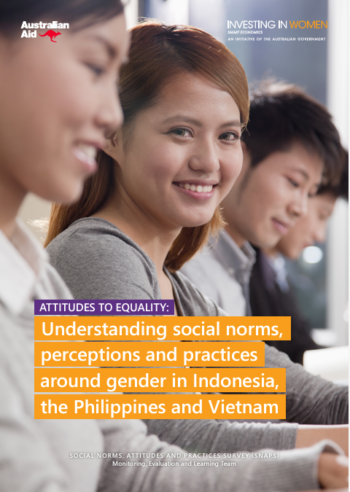Attitudes to equality: Understanding social norms, perceptions and practices around gender in Indonesia, the Philippines and Vietnam
Summary
This report analyses the social norms affecting gender equality in workplaces and homes across Indonesia, the Philippines, and Vietnam, by exploring the results of Investing in Women’s Social Norms, Attitudes, and Practices Survey (SNAPS).
Conducted in 2018, the Social Norms, Attitudes and Practices (SNAP) survey aimed to gain a deeper understanding of women’s and men’s perceptions of gender equality. The survey explores the social norms that may hinder economic growth and the attitudes and practices that underpin these norms.
Surveying 6,000 respondents across Indonesia, the Philippines, and Vietnam, the report reveals how entrenched social norms influence gender roles and highlights the disconnect between perceived equality and actual experiences. This report also provides an overview of existing laws, institutions and social or community initiatives that facilitate the improvement of gender policies in the workplace and gender perceptions in society. Insights from the survey advocate for societal change and supportive policies to align gender perceptions with the realities of discrimination and unequal responsibility for domestic duties, aiming to promote gender equality and women’s economic empowerment in the region.
Key findings suggest that while gender norms across Southeast Asia continue to present barriers to women’s economic empowerment both in the workplace and at home, institutional and societal change have begun among urban millennials.
Highlights
- Indonesia: Despite strong perceptions of workplace gender equality, women report significant levels of discrimination and harassment, indicating the need for improved anti-discrimination policies and stricter enforcement. The contrast highlights a critical need for enhanced workplace policies and enforcement of anti-discrimination laws.
- Philippines: There is high awareness of gender equality, but the practical application of equitable policies, especially concerning parental leave and flexible work arrangements, is lacking. This discrepancy underscores the importance of implementing robust gender-sensitive policies to bridge the gap between awareness and practice.
- Vietnam: There is a noticeable disparity between men’s and women’s views on domestic responsibilities, with societal norms upholding traditional roles. Addressing this disparity requires targeted community and policy interventions to encourage equitable sharing of household duties and support women’s workforce participation.
View other SNAP survey reports:
Gender Equality Matters 2022: Social Norms, Attitudes, and Practices (SNAP) Survey
Download Resources Here


